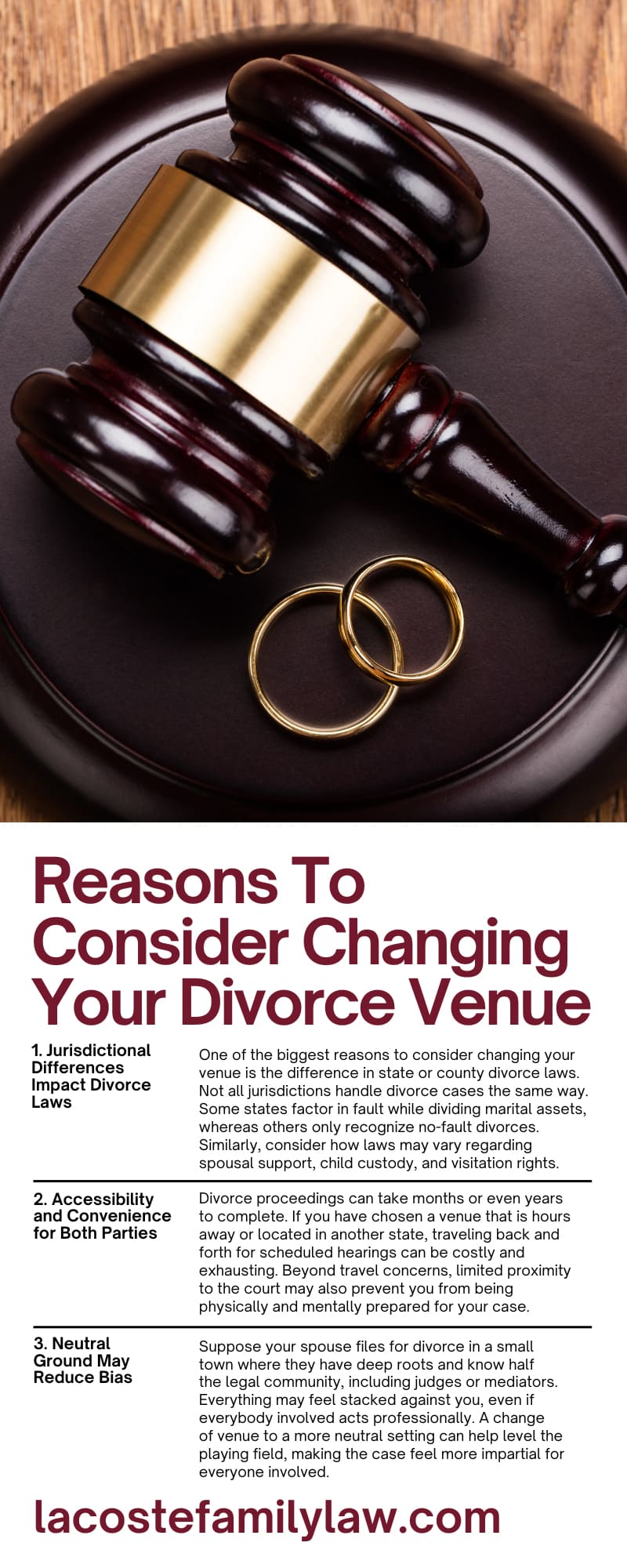
26 Mar 6 Reasons To Consider Changing Your Divorce Venue
Divorce can be emotionally taxing and complex. Amid the emotions and logistics, many people overlook a critical element that could significantly impact their case and outcome: the venue where they file the divorce.
The “divorce venue” refers to the court or jurisdiction handling your case. While it may seem like a mere technicality, the venue can play a powerful role in shaping your divorce proceedings. If you are in a situation where you feel your chosen venue is not the right fit, explore six reasons to consider changing your divorce venue.
1. Jurisdictional Differences Impact Divorce Laws
One of the biggest reasons to consider changing your venue is the difference in state or county divorce laws. Not all jurisdictions handle divorce cases the same way. Some states factor in fault while dividing marital assets, whereas others only recognize no-fault divorces. Similarly, consider how laws may vary regarding spousal support, child custody, and visitation rights.
If Washington State is your divorce venue, be sure to consult divorce lawyers in Washington State for specifics concerning the laws in this area. When you turn to LaCoste Family Law for guidance in the Tri-Cities, Washington area, you put your case in capable hands. Our family law attorney is well-versed in the state’s laws on divorce, spousal maintenance arrangements, child support, custody decisions, asset and property division, and more.
Talk with your attorney about how proceedings typically go in cases where Washington State is the divorce venue. You can rely on their years of experience in family law cases to help you reach a settlement that aligns with your objectives.
2. Accessibility and Convenience for Both Parties
Divorce proceedings can take months or even years to complete. If you have chosen a venue that is hours away or located in another state, traveling back and forth for scheduled hearings can be costly and exhausting. Beyond travel concerns, limited proximity to the court may also prevent you from being physically and mentally prepared for your case.
Consider how this might play out: imagine you have moved to a new county to start fresh, but your divorce case is still ongoing years later in your previous county. Each time you need to attend a hearing, you must take time off work, hire childcare, and spend money on transportation.
Switching to a venue closer to your current location can ease the process for you and even benefit your former spouse if they also face travel challenges. It promotes fairness and accessibility, which courts often encourage.
Pro Tip
Before requesting a venue change for convenience, discuss it with your spouse; if they agree, the court is more likely to grant the switch.
3. Neutral Ground May Reduce Bias
If there’s tension or imbalance between you and your spouse, venue choice can sometimes unfairly tip the scales in one person’s favor. This is particularly true if one party files in an area they have a deep connection with while the other feels like an outsider.
For instance, suppose your spouse files for divorce in a small town where they have deep roots and know half the legal community, including judges or mediators. Everything may feel stacked against you, even if everybody involved acts professionally. A change of venue to a more neutral setting can help level the playing field, making the case feel more impartial for everyone involved.
Pro Tip
Be prepared to show the court why moving your case to a more neutral venue promotes fairness, highlighting potential conflicts of interest in your current venue.
4. Expedited Timeline in a Different Venue
Court systems can become bogged down due to high case volumes, which can significantly slow down divorce proceedings. If you have filed in an overburdened district, you may find yourself endlessly waiting for decisions, hearings, or judgments.
Switching your venue to a less congested court could expedite your divorce. Consider a scenario where one county has a waiting period of 9 months before a judge hears new cases, while a neighboring jurisdiction schedules initial hearings within 60 days. Moving your case to the latter may help you achieve closure sooner.
Courts already understand how delays can affect all parties, so they are often open to granting a change of venue when it reduces unnecessary waiting periods. Research the caseload of nearby courts to determine if a venue transfer could shorten your timeline. Your lawyer can often provide insight into these kinds of logistical details.
5. Improved Access to Specialized Resources
Some venues are better equipped than others to handle cases with special circumstances. For example, divorces may require expertise from court staff, judges, or local legal professionals if they involve complex financial portfolios, high-conflict custody disputes, or multilingual participants.
Unfortunately, some jurisdictions lack the experience or tools needed for these situations. By transferring your case to a venue with the right resources, you stand a better chance of achieving an outcome that takes your unique needs into account.
An urban jurisdiction, for instance, might have family court programs designed for high-net-worth divorces or robust mediation services for parenting conflicts that arise during the divorce process. If your current venue struggles to address a particular issue in your divorce, advocate for the transfer by showing how another court offers the necessary resources or support.
6. Child Custody Concerns and Stability
Child custody arrangements are often one of the most challenging aspects of divorce. Where you file your case could directly influence the court’s perspective on what is in the best interests of the child. Typically, a child must be in Washington state for at least 6 months for a jurisdiction to be in Washington. Check the domestic rules when considering a change of venue with a child.
Judges in some counties or states may favor joint custody, while others lean toward primary physical custody for one parent. Plus, if you and your child have already relocated to a new area, continuing to litigate in a faraway venue may disrupt their schooling, routine, and overall stability. Switching to your current location could simplify custody decisions and maintain consistency for your child.
Pro Tip
Gather evidence demonstrating how relocating the case benefits your child’s daily life, school attendance, and parental involvement.
Changing a divorce venue may initially sound like an unnecessary complication, but for these six reasons, it’s sometimes a critical move. The venue can have a profound effect on the legal process, fairness, and outcomes of your divorce. From ensuring convenience to leveraging jurisdictional differences in your favor, there are many valid reasons to explore this option.
If you are weighing whether to switch venues, speak to an attorney who is familiar with family law in your region. They will guide you in knowing your legal rights, local venue policies, and the potential outcomes of making the change. With thoughtful planning, you can ensure your divorce proceedings occur in the most favorable environment possible.


